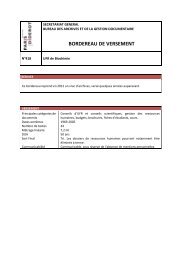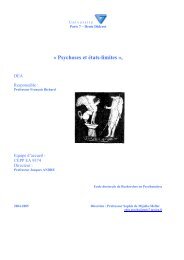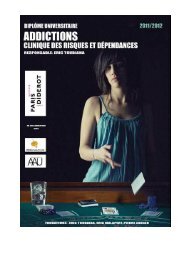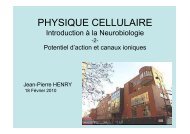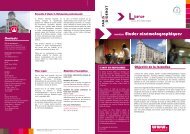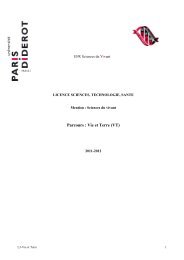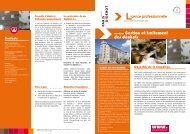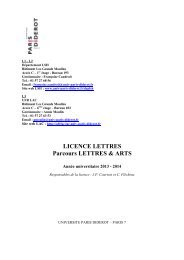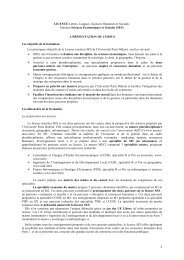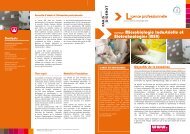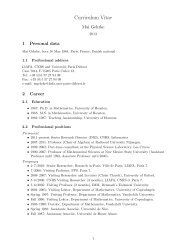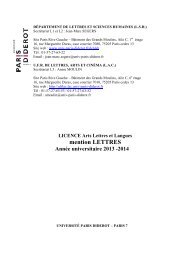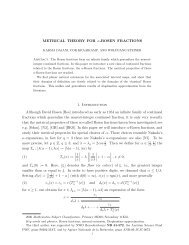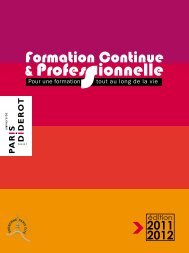Corpora for translator education and translation practice ...
Corpora for translator education and translation practice ...
Corpora for translator education and translation practice ...
You also want an ePaper? Increase the reach of your titles
YUMPU automatically turns print PDFs into web optimized ePapers that Google loves.
Do you collect domain<br />
specific texts?<br />
How do you collect them?<br />
How do you use them?<br />
Do you use corpora in your<br />
<strong>translation</strong> <strong>practice</strong>?<br />
If yes, do you use?<br />
What do you use to search them?<br />
If you do not use corpora, why?<br />
Would you be interested in a<br />
service which quickly provides<br />
domain- <strong>and</strong> language-specific<br />
corpora tailored to your needs?<br />
Would you be interested in a tool<br />
<strong>for</strong> extracting terms from a<br />
domain-specific corpus?<br />
Would you be interested in learning<br />
more about the potential<br />
that corpora offer?<br />
59.5% No<br />
40.5% Yes<br />
69.4% In electronic <strong>for</strong>m<br />
30.6% On paper<br />
53.1% Search through with software<br />
46.9% Read them<br />
60.2% No<br />
39.8% Yes<br />
26.1% <strong>Corpora</strong> of the target language<br />
23.1% <strong>Corpora</strong> of the source language<br />
19.7% Parallel corpora<br />
15.3% Domain specific corpora<br />
13.6% Comparable corpora<br />
2.3% General language corpora<br />
65.9% Search facility in word processor<br />
19.0% Concordancer<br />
14.4% Other search tools<br />
(specify: Trados, Concordance in <strong>translation</strong> memory)<br />
0.7% UNIX utilities<br />
41.9% Never heard about them<br />
19.9% I don’t have time to build them<br />
17.8% I don’t know how to use a concordancer<br />
8.7% I can’t see any advantage over Google<br />
6.8% I can’t see any advantage over <strong>translation</strong> memories<br />
5.0% Other<br />
(1 specified - Not sure if it will work with Macintosh)<br />
78.6% Yes<br />
21.4% No<br />
77.9% Yes<br />
22.1% No<br />
82.4% Yes<br />
17.6% No<br />
Table 3: Corpus section of MeLLANGE questionnaire (first round, closed questions)<br />
or expression as one would search the Internet), <strong>and</strong> Text-<br />
Stat only offers basic web-search facilities (i.e. it does not<br />
interact with a search engine, but simply spiders a specified<br />
URL), the BootCaT toolkit 3 (Baroni <strong>and</strong> Bernardini, 2004)<br />
was created specifically <strong>for</strong> <strong>translation</strong> students <strong>and</strong> professionals,<br />
i.e. <strong>for</strong> users who need relatively large <strong>and</strong> varied<br />
corpora (typically of about 1-2 million words), <strong>and</strong> who are<br />
likely to search the corpus repeatedly <strong>for</strong> both <strong>for</strong>m- <strong>and</strong><br />
content-oriented in<strong>for</strong>mation within a single extended task.<br />
Starting from a series of “seeds” (search words), this set of<br />
Perl scripts provide facilities <strong>for</strong> combining the seeds into<br />
sequences, submitting queries to Google, retrieving URLs<br />
(<strong>for</strong> manual inspection if necessary) <strong>and</strong> eliminating duplicates.<br />
Then <strong>for</strong> each URL the text is retrieved, cleaned, <strong>and</strong><br />
printed to a text file. This procedure can be iterated if larger<br />
corpora are required, e.g. selecting seeds <strong>for</strong> a second round<br />
of searches from the initial corpus <strong>and</strong> repeating the various<br />
steps. These tools have been used <strong>for</strong> several projects,<br />
3 http://sslmit.unibo.it/˜baroni<br />
including the construction of Internet corpora <strong>for</strong> several<br />
languages (see Sharoff’s website 4 <strong>and</strong> Ueyama (<strong>for</strong>thcoming)).<br />
The results in Table 1 were derived from a comparable corpus<br />
of English <strong>and</strong> Italian texts on wine tasting collected<br />
with BootCaT <strong>and</strong> used in an English to Italian <strong>translation</strong><br />
course at the School <strong>for</strong> Translators <strong>and</strong> Interpreters<br />
of the University of Bologna, Italy. The conventions of this<br />
genre both in English <strong>and</strong> in Italian are unknown to virtually<br />
all the students in this course. A specialised comparable<br />
corpus is indespensable to (learn to) search <strong>for</strong> genrerestricted<br />
phraseology <strong>and</strong> terminology, two of the central<br />
know-hows identified by Gouadec (above). Given the time<br />
constraints under which <strong>translator</strong>s normally operate, mastering<br />
techniques <strong>for</strong> the quick-<strong>and</strong>-dirty construction of<br />
corpus resources could be an additional asset.<br />
4 http://www.comp.leeds.ac.uk/ssharoff/



